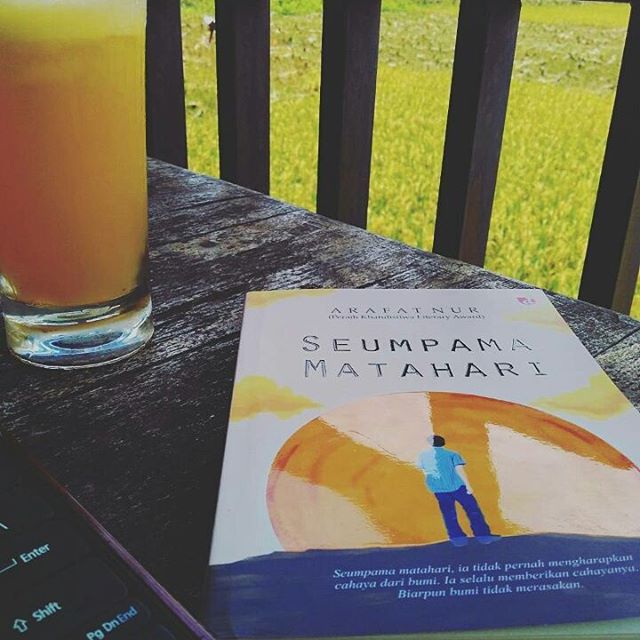Love and War in the Novel of Seumpama Matahari
Well hello Stemian...
Tonight I'm going to review a novel that I think this is a very creative work that is worth to read and review. Maybe some of you guys here have already read it, because this novel has been released last year but this novel will be very good to be reviewed here considering this novel will continue to accompany me until the end of making my thesis. lol.

Seumpama Matahari is the fifth novel by Arafat Nur with its Acehnese setting. The book itself - quoting the author - was written based on guerrilla note Thayeb Loh Angen, combatant of Free Aceh Movement (GAM). This story will almost be annihilated by the culprit himself, but the author managed to save it and then immortalize it into a novel.
Sometimes, War is seen as black and white: good against evil. In fact, in every event there is always complexity, there are other stories that must also be viewed comprehensively so that we are not easy to judge. These other stories are rarely recorded history. Here, literature can be present to voice it. The novel entitled Seumpama Matahari tells of Asrul, a young Acehnese freedom fighter. If all along we may have seen the war in Aceh only about Indonesian soldiers fighting to secure the rebels from the Free Aceh Movement (Gerakan Aceh Merdeka, GAM), this novel invites us to look at it from another perspective, the point of view of the perpetrators.
"Kita sama-sama anak bumi, pengatur sekaligus penjaga alam." (hlm. 69)
The novel opens with intense combat scenes. The way the author unfolds reminds me of the styles of the writer abroad, who instantly snaps the reader's attention through very strong words of description: Mati kena tembak adalah salah satu jalan akhir dari banyak jalan akhir lain pada kehidupan ini. Meskipun mati dengan cara begitu sangat tidak menyenangkan, secara tidak langsung, saat ini telah menjadi pilihan yang dengan sadar sedang kami hampiri perlahan-lahan.
This style that is close to poetic but strong often be encountered while reading this book. Furthermore, readers will be invited to follow the story of Asrul, an Acehnese freedom fighter who fought guerrilla warfare against TNI in the interior of Sumatra around 2001.
"Adanya hari ini memang disebabkan masa lalu. Namun, manusia lahir untuk masa depan." (hlm. 111)
Reading literature teaches us not to judge and not hesitate to empathize. This is because the literature broadens our view, by inviting us to look at it from the perspective of others. That's what this Sun Seumpama is like. We are invited to see one of the GAM forces. From his perspective, the reader knows why GAM hates the TNI and Indonesia. Resistance does not arise directly, usually preceded by oppression or unfair treatment.
Indirectly, readers are invited to sympathize with Asrul. The young man became like that, because of the inhuman treatment by a handful of TNI troops to his innocent father. This is where the grudge arises, which then gets channeled through GAM.
In general, this book tends to oppose the war between GAM and the TNI. But the great thing is Arafat Nur conveyed his idea by not patronizing. Vague but clear, the author inserted the idea of peace in Aceh through a simple but very touching love story.
This story offers another color behind the Aceh war, as well as invites the reader to reflect on what the war really is. After arriving at the end of a book that closes equally strongly, we will be compelled to ask ourselves: why do we keep on fighting?
Nice posting
great work,
thanks
Arafat nur salah satu penulis aceh favorit saya, keren ceritanya.